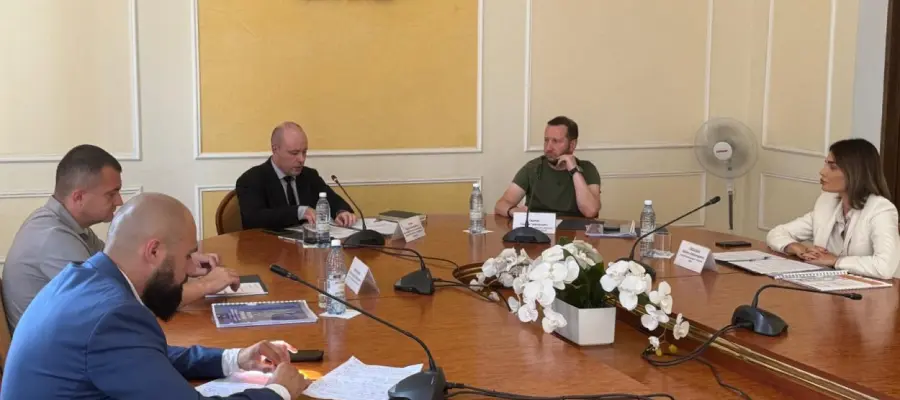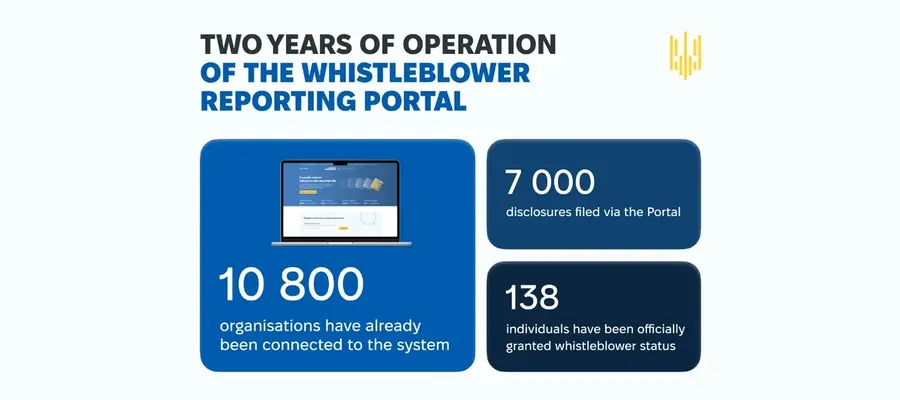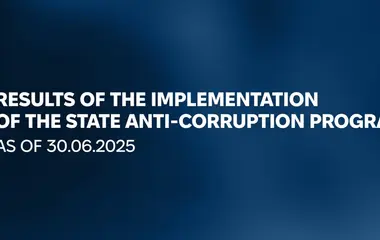The team of the National Agency on Corruption Prevention (NACP) met with the leadership of the Khmelnytskyi Regional Military Administration, as well as the Khmelnytskyi Regional and City Councils during a working visit to Khmelnytskyi Oblast. To comprehensively analyze the situation in the region and engage in a direct dialogue, Deputy Head of the NACP Serhii Hupiak also met with law enforcement officers, civil society activists, journalists, educators, and students.
The purpose of this interaction is to establish constructive cooperation for the effective implementation of the state anti-corruption policy, to hear firsthand about the problems and demands of the region, and to share effective anti-corruption tools, the introduction of which will eliminate the causes of corruption and at the same time increase the level of integrity in the public service.
During the meetings with the heads of Khmelnytskyi Regional Military Administration Serhii Tiurin, Khmelnytskyi Regional Council Violeta Labaziuk, and Khmelnytskyi Mayor Oleksandr Symchyshyn, Serhii Hupiak emphasized the need to implement the measures provided for by the State Anti-Corruption Program until 2025 (“SACP”) for local governments and regional administrations and the tools developed by the NACP to build integrity in communities. After all, it is the persistence of the local leadership that determines how quickly and efficiently all preventive anti-corruption mechanisms will work.
“Local authorities should be the face of integrity. After the successful implementation of the decentralization reform, not only local budget revenues have increased. The responsibility of those who manage these funds has also increased. The public still has a consistently high demand for the inevitability of responsibility for corruption crimes. Therefore, local authorities must be aware that citizens will demand openness and transparency in the spending of their money. Community leaders and local deputies should primarily be focused on minimizing corruption risks, working not to deal with the consequences of problems but to prevent them. The NACP continues to build partnerships with regional authorities and invites all bodies to join it. But this cooperation does not imply indulgences. For those officials who disregard the law and cross the line, let me remind you that the NACP has all the necessary countermeasures, including financial control tools and high-quality interaction with colleagues from the NABU, SAPO, State Bureau of Investigation and other agencies,” said Serhii Hupiak.
He emphasized the need for and the unavoidability of using modern anti-corruption tools developed by the NACP to build the state's resilience, and effectively counter current security challenges and future EU membership.
Among these tools is the institution of anti-corruption officers. Currently, they are not yet sufficiently independent, and their activities are often formal. They should be as professional and objective as possible in their work. Their task is not only to control the timeliness and completeness of the declarations submitted by public officials but also to work to identify corruption risks and organize efforts to manage them.
Public procurement and the post-war reconstruction of Ukraine remain the most vulnerable areas to corruption and require special attention from local authorities, which will be a challenge for local authorities in particular. For example, the NACP conducted a strategic analysis of corruption risks during the implementation of a pilot project to restore settlements affected by Russian aggression. This project identified a number of corruption risks that could contribute to corruption offenses. Taking into account the recommendations developed by the NACP will help local authorities make the recovery process accountable and transparent, prevent abuse, and increase public and investor confidence. The attention of anti-corruption and law enforcement agencies to the recovery process will be increased.
“Regional authorities and local self-government bodies are part of the global system of corruption prevention in Ukraine. The introduction of the Unified Whistleblower Reporting Portal a year ago has become a powerful tool of this system. We want the institution of whistleblowing to become an effective mechanism for building integrity. It is based on international standards and best practices. Unfortunately, I have to state that only a small number of municipal enterprises in the city and region are currently connected to the Portal. We expect the city and regional councils to provide information to connect all enterprises, institutions, and organizations under their jurisdiction to the Portal without exception,” said Serhii Hupiak.
The head of the Khmelnytsky Regional Military Administration, Serhiy Tyurin, said that the administration's anti-corruption program for 2024-2026 is currently at the final stage of development, and the regional military administration has established a working group to identify corruption risks. He also assured that information on public procurement in the area of the regional government is made public, and representatives of the media, the public, and law enforcement agencies are involved in the work of the Transparency and Accountability Group.
Khmelnytskyi City Mayor Oleksandr Symchyshyn emphasized the importance of direct interaction with the NACP representatives.
The city council, as well as the regional council and the regional executive authority, are connected to the Whistleblower Reporting Portal. The city has a five-year project to promote integrity in the public sector under the USAID program. All decisions made by city council members are published on the geographic information portal.
The meeting participants also touched upon the issue of preventing conflicts of interest in the activities of public servants and the need for legislative regulation of certain aspects of this area.
During the meetings with the city and regional leaders, Serhii Hupiak emphasized the importance of a proactive position in building integrity in communities and society as a whole. At meetings with the media, educators, students, and civil society organizations, he also called for maximum use of the tools offered by the NACP to report corruption, signs of illicit enrichment, etc. Such reports will become the basis for further actions by anti-corruption agencies and will ensure that the authorities are cleansed of corrupt officials.
As part of the regional visits project, NACP representatives have already visited Lviv, Kharkiv, Dnipro, Chernivtsi, Zhytomyr, Ivano-Frankivsk, Vinnytsia, Lutsk, and Cherkasy.
The project was created to strengthen the NACP's cooperation with communities, local authorities, secondary and higher education institutions, journalists, and civil society organizations, and to promote building integrity through community engagement.









